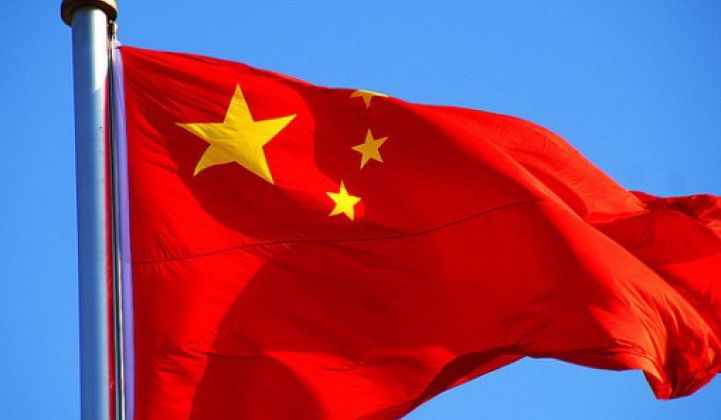Germany's SolarWorld lauched a U.S. anti-dumping trade claim against China in solar PV modules through SolarWorld America in October of last year. The firm was well within its corporate responsibility in its actions. SolarWorld has pressured for an anti-China trade claim to be made in Europe as well.
But trade claims and anti-dumping tariffs don't always have clear and intended consequences.
In some cases, relatively innocent bystanders get bludgeoned by the blunt anti-tariff penalties. We've reported on two tiny American solar manufacturers whose businesses are in jeopardy because of retroactive tariffs on imported solar products.
Shyam Mehta's and Carolyn Campbell's analysis today shows that the anti-dumping and countervailing duty tariffs of 36 percent don't impact the pricing of modules enough to meet parity with the (fairly priced?) SolarWorld panels. In Mehta's words, "I have been skeptical from the outset that it will result in any real benefit for domestic module manufacturers."
But the impact of anti-dumping rulings on American polysilicon firms, the makers of the feedstock upon which silicon solar panels are based, could be even more severe.
China's Ministry of Commerce (MOFCOM) today said that it would look into anti-dumping and anti-subsidy claims on U.S. imported polysilicon, according to Reuters. According to the report, "The ministry issued the decisions in two statements on its website, citing preliminary evidence from several companies -- GCL Poly-Energy Holdings, LDK Solar, and Daqo New Energy."
The U.S. polysilicon manufacturers most likely to be affected by the ruling would be Hemlock, MEMC, and OCI as well as REC which has its polysilicon factory capacity in the U.S.. In 2010, the exports of these U.S. firms into China resulted in a positive solar trade balance for the U.S.
Dow Corning is the majority owner of Hemlock Semiconductor, one of the largest manufacturers of polycrystalline silicon, and its CEO Robert Hansen had this comment in a statement:
"On behalf of Dow Corning Corporation and Hemlock Semiconductor Group, I am disappointed that the United States and China have yet to negotiate a sustainable, mutually beneficial settlement to the global trade issues that have arisen in the solar industry. This review is part of a broader trade conflict extending far beyond the polysilicon and solar industries, as an escalating number of trade disputes have been initiated throughout the globe in the last 12 months. This issue is serious and could impact Hemlock Semiconductor’s ability to sell material to China -- its largest market -- if the Chinese government assesses duties against U.S. manufactured polysilicon sold into China.
This case proves that no country or industry wins when trade disputes escalate. In China, these actions threaten the Chinese solar industry’s access to the critical technical collaboration and materials that supply companies like Hemlock Semiconductor currently provide Chinese solar cell and module producers. This could lead to higher costs and potentially fewer globally competitive solar products from China. In the United States, more than $1 billion of U.S. exports and potentially thousands of U.S. jobs across the solar value chain are at risk -- as is the steady growth of the U.S. solar industry.
CASE's President, Jigar Shah had this comment:
“SolarWorld’s decision to seek tariffs to benefit itself at the expense of the rest of the solar industry directly triggered this reaction. Tariffs at any point in the global solar value chain are counterproductive and make solar less competitive against fossil fuels. Disruptions in the free flow of solar goods will raise prices, eliminate jobs and hurt businesses at every level of the global solar industry. We urge all countries to avoid unilateral actions that impede trade and resolve conflicts in a bilateral or multilateral context. Specifically, we urge the U.S. and China to rise above SolarWorld’s selfish action and engage in constructive dialogue to prevent this destructive trade war. Lowering, not artificially raising, the cost of solar should be a global goal.”
SolarWorld America's President, Gordon Brinser, responded:
“Today’s announcement by the Chinese government proves once and for all that the it is intent on unfairly and illegally allowing its manufacturers to dominate the global solar industry. While it was not unexpected, the announcement of retaliatory investigations into U.S. polysilicon production is harmful to the international trade system. The Chinese government has been telegraphing this move since last October. It is a common Chinese tactic and an abuse of international trade rules. It represents yet another cynical attempt by the Chinese government to bully the U.S. government by injecting politics into a judicial investigation that is sanctioned under international trade rules, as today’s announcement tacitly confirms. Fortunately, when the Chinese government has attempted such blatant retaliatory actions, its actions have been declared illegal by the World Trade Organization.
“The American people understand the Chinese do not play by the rules and are demanding action. In one recent poll, more than two-thirds of voters think China’s violations of international trade rules are costing the U.S. jobs. As a result, 62 percent of voters favor getting tough on China’s illegal trade practices.
“Today’s announcement is also an attempt to decimate another competitive American industry: the polysilicon industry. It is an attempt to shut down the Chinese market all while the Chinese government injects billions of dollars of likely WTO-illegal subsidies to build up its domestic polysilicon companies, as outlined in its latest Five Year Plan. At the same time, the Chinese government is browbeating U.S. and other manufacturers into arguing for unilateral trade disarmament. This ploy affects not just the U.S. solar industry, but also the semiconductor industry, another industry in which Chinese companies lags American manufacturers.”
China's polysilicon industry is in its own oversupplied and profitless shambles.



